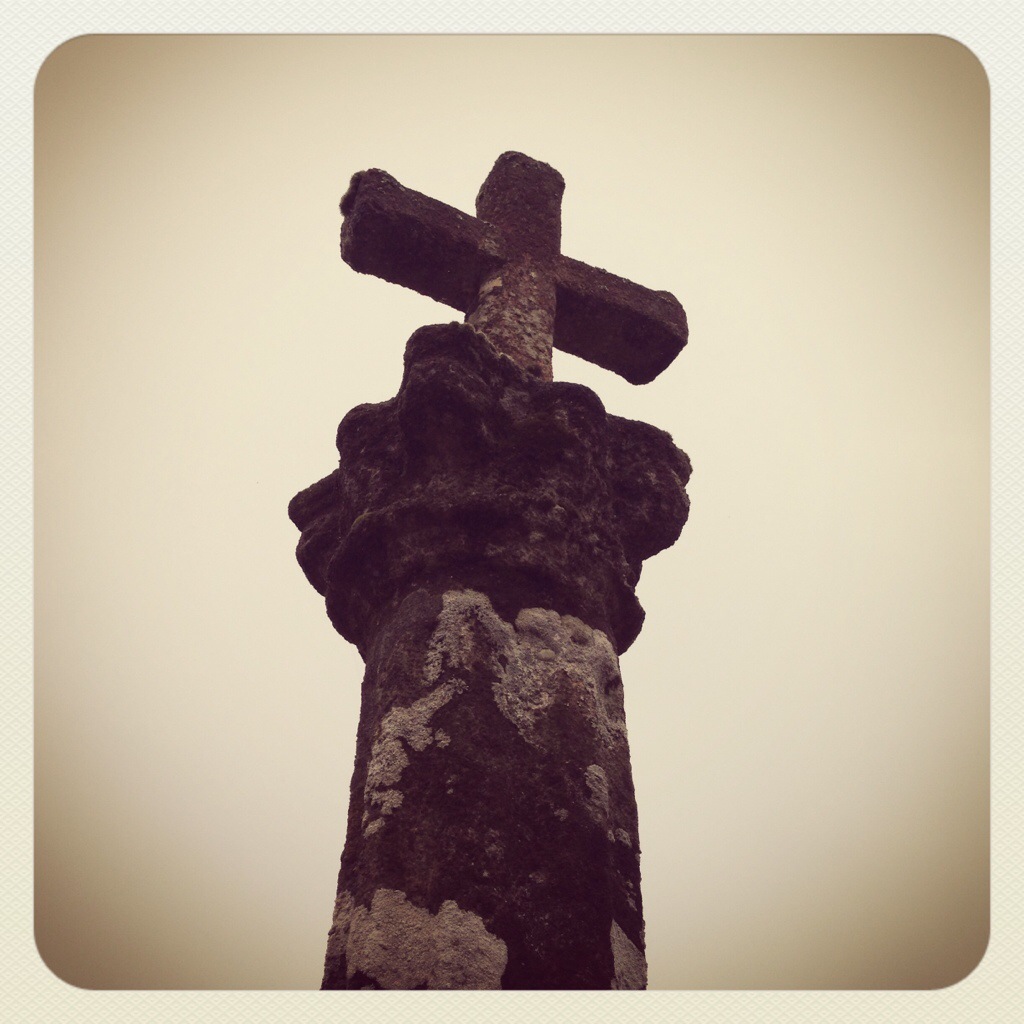Today was our third day walking on the Camino de Santiago. We have now walked more days than we have left to walk; we have spent more days in Spain than we have left to spend. The mist that traveled with us yesterday turned into rain overnight and stayed with us as we began the longest stage of our journey: twenty-five kilometers — fifteen miles. Yesterday’s walk was a climb; today we were starting at a higher elevation than we would finish, but there were still a few hills to get over.
Much of the walk today made me think of the history into which we have stepped because the paths felt old. They were trails somehow dug into the forests and between the fields, with high embankments and sheltering arbors. And they were dirt. Well, today they were mud. Our pace was slower because we often had to walk single file with the other peregrinos (pilgrims) on the trail and we had to choose our steps carefully to try and find a place to step where our feet didn’t sink into mud or manure. Along the way we found the directions left for us: the yellow arrows, the kilometer markers, the churches and cemeteries, and cruceiros, which are large stone crosses some of which date back eight or nine hundred years.
In a couple of places, we had to stop and look for the directions to figure out where to go next. The rain, the mud, and the stacks of signals gave me a window through which to catch a glimpse of those who have walked before us. 2014 is significant here because it marks the eight hundredth anniversary of St. Francis walking the Camino. He not only walked the pilgrim trail, he walked from Assisi to begin with. For most of history, walking has been our primary form of transportation. Only now do we ride and fly and drive to get to where we begin to walk. They walked from wherever they lived to get to the place to begin walking for whatever purpose brought them to the Camino.
I have yet to meet someone who is walking for faith reasons, which is intriguing to me. An American our group met has been wanting to walk since 1953. An Australian man had planned to walk in 2012 and realized he had arthritis and had to postpone his pilgrimage. He and his wife had planned to do it this year and then she was unable to come. He was walking with a friend and were on their forty-eighth day. A Venezuelan woman who walked with us a good part of the afternoon began with her husband and a friend who were both injured, so she walked with us. We have seen people walking, biking, and riding horses on the trail. For many years those who walked before us were compelled to do so. It was a way to forgiveness, an act of penance, an act of devotion. It was not something to check off of a bucket list. It was a dangerous enterprise.
The rural paths we followed were once the ways people got from village to village and they were not always safe. The albergues where the pilgrims would stop to eat and sleep at night were their own risk for both safety and health. One of our guides said they changed the straw in the bed once a year. To walk the Camino was to take your life in your own hands, or put it in God’s hands, in order to do what you felt compelled to do. Along the way there were hospitals and even cemeteries dedicated to the pilgrims. As the rain fell and our clothes got wetter, as we felt more uncomfortable and determined, as we sloshed and stepped and slid our way up and down the hills, we brushed up against the spirits of those who had once walked this way, at the mercy of the weather and unaided by technology.
The last few kilometers into the little village where we are staying tonight began with a rather brutal uphill climb — or at least it felt brutal after the twenty rain-soaked kilometers before we turned the corner and saw the hill in front of us. For that stretch, Ginger and I were alone with the rain and the mud and the surrounding greenery, alone with the aches in our knees, alone with with each other. The evidences of humanity were all around us. We saw the colored ponchos on the backs of three pilgrims a good bit up the road, we passed houses and freshly plowed fields, we saw gardens and heard dogs bark their greetings. We were not alone. We were being afforded space to be, room to breathe, a thin place to attend. We were wet and tired and still amazed at what we were getting to do. We opened a gift that has demanded a good deal of us, that has called us beyond ourselves and our expectations. We have walked far and have more miles yet to go. Then we, at least in the spirit of the pilgrims who have come before us, will work our way home, perhaps with a different eye for the signs that might point us there.
Peace,
Milton

good to read of your journey. There are things you realize now as you are walking and the things that are being stored to reveal themselves later. I like reading of the former, and like you, waiting upon the latter. Walk on. Thanks for giving us notes.